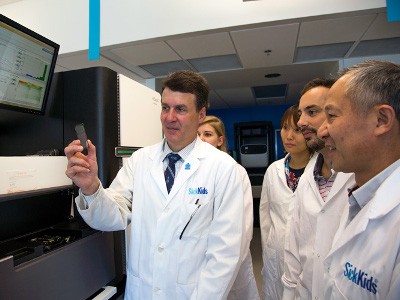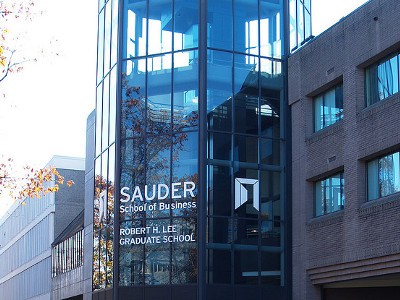University of Toronto researchers to sequence genomes of 10,000 people per year


The University of Toronto has announced a massive project to sequence the whole genomes of 10,000 people per year, using Big Data to better understand complex diseases and create the next generation of precision therapies.
The combination of access to new genome sequencing facilities and computing power promise to drive transformational medical research at the UofT, using whole-genome sequencing to find genetic defects that underlie diseases, and to develop precision diagnostics and treatments for them.
“With sequencing now married to large-scale computation, I believe we in Toronto can help lead the way for precision medicine. Genomic information is the new oil. It’s the resource that’s going to drive technology in the new era,” said Professor Stephen Scherer, director of U of T’s McLaughlin Centre and the Centre for Applied Genomics at The Hospital for Sick Children (SickKids). “We’re generating the oil that researchers will use to enable discoveries and to create new products in software, biotechnology and information management that will realize precision medicine.”
The project was spurred into action by the 2015 purchase of an Illumina HiSeq X Ten sequencing system, along with the computing power to process 10,000 genomes per year, funded by a grant from the Canada Foundation for Innovation.
Before the purchase of that system, researchers in Toronto had to send genomes to outside facilities for sequencing, which cost significantly more and led to delays.
Even using that system, though, Toronto researchers have been responsible for remarkable breakthroughs, such as the work of Lap-Chee Tsui, who identified the genetic defect causing cystic fibrosis.
“The groundbreaking work that U of T and SickKids have done for the MSSNG Autism Genome Sequencing Project and the Canadian Personal Genome Project has set the stage for the creation of a large pediatric reference genome that will have far reaching utility in complex disease,” said Illumina executive vice-president and chief commercial officer Christian Henry. “We believe Toronto’s research community is already linked to vast repositories of patient health data and is committed to finding answers in complex diseases.”
Bringing the ability to quickly sequence genomes in-house offers Scherer and his fellow researchers the opportunity to generate data that can be used as control genomes for the world’s researchers, providing a yardstick by which to compare their disease research.
“Whole genome sequencing is bringing the worlds of life science and data science together,” said David Glazer, on the Steering Committee for the Global Alliance for Genomics and Health, founder of Google Genomics, and engineering director at Verily Life Sciences. “The combination of those two disciplines is one of the most exciting frontiers in medicine today. Our existing collaboration with Steve’s lab on the 10,000-genome MSSNG project is a good example of the opportunity; we’re eager to see the many more such projects enabled by today’s announcement.”
Verily Life Sciences, a partner already involved in the University’s whole genome project, is an Alphabet company (aka. the company formerly known as Google).
“Whole genome sequencing is bringing the worlds of life science and data science together,” said David Glazer, on the Steering Committee for the Global Alliance for Genomics and Health, founder of Google Genomics, and engineering director at Verily Life Sciences. “The combination of those two disciplines is one of the most exciting frontiers in medicine today. Our existing collaboration with Steve’s lab on the 10,000-genome MSSNG project is a good example of the opportunity; we’re eager to see the many more such projects enabled by today’s announcement.”
Part of Toronto’s attraction is its diversity, as a city that attracts people from around the world, putting a unique breadth of genetic material at the researchers’ disposal.
“Toronto has unique advantages in the world that allow us to generate high-quality data sets and manage those securely and ethically,” said UofT dean of the Faculty of Medicine Professor Trevor Young. “Within a mile radius we have one of the world’s leading medical schools, connected to most of Canada’s top hospitals and other key research fields such as computer science and engineering, as well as the headquarters of Canada’s top financial institutions.”
The University of Toronto’s Faculty of Medicine counts nearly 6,000 faculty members working in 33 hospitals in the Greater Toronto Area.
This new genome sequencing initiative just cements the University of Toronto as a key player in the development of Canada’s largest innovation ecosystem, providing researchers and facilities in the fields of medicine, advanced computing and artificial intelligence, biomedical engineering, advanced materials, cybersecurity, and cleantech.
With MaRS situated on the UofT campus, now leasing space to Johnson & Johnson’s cutting-edge JLABS, as well as Facebook and Autodesk, the entire Toronto ecosytem is consolidating around institutions like the OneEleven tech accelerator, which is expanding its office space from 15,000 to 250,000 square feet, and Ryerson’s DMZ business incubator.

Terry Dawes
Writer


